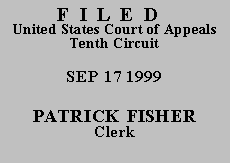

| VERNON J. TURNER, III,
Plaintiff-Appellant,
v.
LEE GIBBENS, DAVID R.
MCKUNE, WILLIAM L.
CUMMINGS, Defendant-Appellees. |
No. 99-3038
(D.C. No. 98-CV-3345-GTV) (Kansas) |
Mr. Vernon J. Turner, a pro se plaintiff, alleges civil rights violations under 42 U.S.C. § 1983 against officials of the state prison where Mr. Turner is currently incarcerated. The district court dismissed the complaint for failure to state a claim. Mr. Turner appeals and we affirm.
We review de novo the dismissal of Mr. Turner's complaint for failure to state a claim. See Peterson v. Shanks, 149 F.3d 1140, 1143 (10th Cir. 1998). We liberally construe a pro se plaintiff's pleadings. See Haines v. Kerner, 404 U.S. 519, 520-21 (1972) (per curiam). At the Lansing Correctional Facility, Mr. Turner was assigned to assist a disabled inmate. After a conflict with a prison official who accused Mr. Turner of neglecting his responsibilities, Mr. Turner's status was changed to "Unassigned for Cause," which resulted in excluding him from various prison jobs. Mr. Turner filed grievances after which it was determined that Mr. Turner had not neglected his responsibilities. His status, however, remained unchanged. He argues that the failure to follow prison regulation procedures in changing his status and the failure to reinstate his status are violations of the Due Process Clause.
To allege a valid section 1983 claim, the plaintiff must assert the denial of a liberty interest that is a right, privilege or immunity secured by either the Constitution or federal law. See Adickes v. S.H. Kress & Co., 398 U.S. 144, 150 (1970). We have held there is no constitutionally protected liberty interest in a prison classification. See Templeman v. Gunter, 16 F.3d 367, 369 (10th Cir. 1994). Nor does the Constitution create any property or liberty interest in prison employment. See id. at 370; Ingram v. Papalia, 804 F.2d 595, 596 (10th Cir.1986) (per curiam). Although states may in some circumstances create liberty interests protected by the Due Process Clause, these interests "will be generally limited to freedom from restraint which ... imposes atypical and significant hardship on the inmate in relation to the ordinary incidents of prison life." Sandin v. Connor, 515 U.S. 472, 484 (1995). We apply the Sandin test to evaluate interests created by prison regulations. See Penrod v. Zavaras, 94 F.3d 1399, 1406, 1407 (10th Cir.1996) (per curiam).
In the instant case, Mr. Turner has not shown that his reclassification implicates a liberty interest. He has no constitutional liberty interest in being classified as "assigned" to work in prison. See id. at 1407. Moreover, his reclassification does not concern freedom from restraint and does not impose atypical or significant harm. While we are sympathetic to Mr. Turner's position that prison officials ought to be as judicious and consistent as possible in applying their regulations, under the law Mr. Turner's contentions that the reclassification violated prison regulations does not amount to a valid constitutional challenge.
Mr. Turner also contends that the district court's failure to address his request for appointment of counsel is reversible error. Mr. Turner concedes he has no constitutional right to counsel under 28 U.S.C. § 1915(d). Under
§ 1915(d), which gives the court discretion to appoint counsel. When, as here, the lower court provides no reason for denying a request for counsel, this court may choose to independently examine the propriety of such a request. See Rucks v. Boergermann, 57 F.3d 978, 979 (10th Cir.1995). In Rucks, we denied a request for counsel where the plaintiff showed a solid grasp of the non-complex issues, had little likelihood of prevailing, and presented no special circumstances such as blindness or speech impairment. Id. In the instant case after reviewing the record, we believe the same can be said about Mr. Turner. He shows a fair grasp of the issues, has little likelihood of prevailing, and has presented no special circumstances. Accordingly, we see no need for counsel.
We AFFIRM the district court in all its procedures.
ENTERED FOR THE COURT
Stephanie K. Seymour
Chief Judge
*.This order and judgment is not binding precedent, except under the doctrines of law of the case, res judicata, or collateral estoppel. The court generally disfavors the citation of orders and judgments; nevertheless, an order and judgment may be cited under the terms and conditions of 10th Cir. R. 36.3.